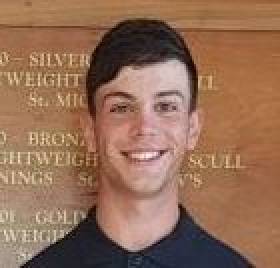Displaying items by tag: Workmen's
Flesk Valley and Workmen's Senior Champions at All Ireland Rowing
#CoastalRowing: The good results kept coming for Kerry clubs on the second day of the All Ireland Coastal Rowing Championships in Wexford. Flesk Valley won the senior men’s championship, while Workmen’s took the senior women’s crown. A Donegal club did break into the winning ranks. Cumann Rámhaíochta Chloich Cheann Fhaola (Cloughaneely CCF) had wins in women’s, men’s and mixed classes.
ICRF All Ireland Coastal Championships (Selected Results; winners):
Saturday
Men
Open Classic: Cloughaneely CCF
Celtic Longboats: Vartry A
Heritage: St Patrick’s. Under-18: Cromane
East Coast Skiffs: St Patrick’s. Under-16: Stella Maris
Under-21: Flesk Valley
Under-16: Fossa
Intermediate: Workmen’s.
Pre Veterans: Commercial, Killarney
Masters: Glenarm
Women
Celtic Longboats: Vartry
Heritage: St Patrick’s A. Under-18 Heritage: Cromane
Open Classic: Cloughaneely CCF
East Coast Skiffs: St Michael’s. Novice: Fingal
Under-21: Workmen’s
Intermediate: Workmen’s
Pre Veterans: Workmen’s
Mixed
Veteran: Workmen’s A
Sunday
Men
Senior: Flesk Valley
Currach: Cloughaneely CCF
Novice: Flesk Valley
Junior: Vartry
Under 18: Workmen’s
Veteran: Commercial, Killarney
Women
Senior: Workmen’s
Currach: Fergus
Novice: Cloughaneely CCF
Junior: Workmen’s
Under 18: Workmen’s
Under 16: Flesk Valley
Veteran: Sneem
Mixed
Senior: Vartry
Currach: Cloughaneely CCF
Pre-Vet: Workmen’s
Masters: Templenoe
#Rowing: The Workmen’s junior women’s double took a silver at the National Schools’ Regatta at Dorney Lake in England today. In the Championship Doubles, Annie O’Donoghue and Ciara Browne finished one and a half lengths down on Latymer Upper School. Ciara Moynihan of Workmen’s finished seventh in the A Final of the Championship Singles, while Molly Curry of Coleraine Grammar School took control of the B Final and won.
Enniskillen took silver in the Boys’ Non-Championship Eights, and their girls’ junior 16 coxed four matched them in their A Final. Ireland clubs placed second and third in the B Final of the Girls’ Championship/Non Championship Eights.
British National Schools’ Regatta, Dorney Lake (Selected Results; Irish interest)
Saturday
Boys
Championship/Non-Championship Eight – B Final: 3 Enniskillen RBC.
Girls
Championship/Non-Championship Eight – B Final: 2 Galway 7:35.72; 3 St Michael’s 7:45.46.
Junior 16 Four, coxed – A Final: 2 Enniskillen RBC 8:22.68.
Sculling, Double – Championship A Final: 2 Workmen’s (A O’Donoghue, C Browne) 8:06.37.
Single – Championship A Final: 7 Workmen’s (C Moynihan) 9:10.40. B Final: 1 Coleraine Grammar School (M Curry) 8:43.03.
O'Donovans Burn Off Rivals at Ireland Rowing Trials
#Rowing: Paul O’Donovan and Gary O’Donovan produced the best performance of the first Saturday session of the Ireland trials. The lightweight double beat their Skibbereen under-23 rivals Jake and Fintan McCarthy by 8.4 seconds and a heavyweight double of Ronan Byrne (UCC) and Philip Doyle (Queen’s) by 3.9 seconds.
The heavyweight pair of Shane O’Driscoll and Mark O’Donovan also put their challengers firmly behind them. They raced at a high rate in the good conditions and beat Patrick Boomer and Andy Harrington by 6.6 seconds.
Three senior women’s crews performed well. Single sculler Sanita Puspure and the heavyweight and lightweight doubles of Monika Dukarska and Aileen Crowley and Denise Walsh and Margaret Cremen all looked on form as the selectors decide on which crews to send to the World Cup Regatta in Belgrade.
In the junior trials, Annie O’Donoghue and Ciara Moynihan of Workmen’s won a fine doubles race. Aoibhinn Keating of Skibbereen and Ciara Browne of Workmen’s were their closest rivals, but Mollie Curry of Coleraine GS and Eimear Crowley of Kenmare contended at the finish and were just 1.4 seconds off the winners.
Curry and Keating Top Double at Trial [UPDATE]
#Rowing: Molly Curry and Aobhinn Keating had the fastest time in a women’s double at the Ireland junior trial at the National Rowing Centre in Cork. The Coleraine Grammar School and Skibbereen combination covered the 2,000 metres in seven minutes and 45.13 seconds. We apologise for having got this wrong in the original report.





























































